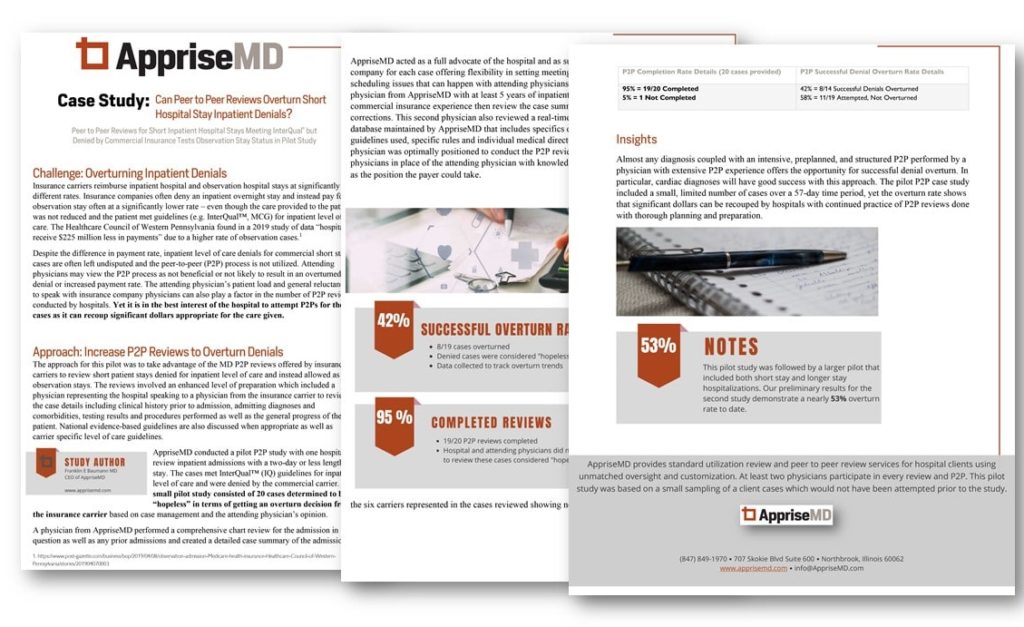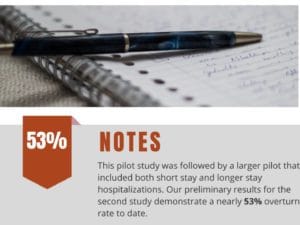Case Study
CAN PEER-TO-PEER REVIEWS OVERTURN SHORT HOSPITAL STAY INPATIENT DENIALS?
Inpatient admissions less than two days in length which have been denied by a commercial carrier are appropriate for Peer-to-Peer Review, but not all hospitals and doctors have the time or the will to do these reviews. Once we have moved past the extreme situation of the COVID-19 pandemic, hospitals are going to look hard at finding any way they can recoup dollars. We have done a limited study and seen the benefit of P2P reviews at AppriseMD and how it can reverse denials and recoup dollars for hospitals.
Peer to Peer Reviews for Short Inpatient Hospital Stays Meeting InterQual® but Denied by Commercial Insurance Tests Observation Stay Status in Pilot Study
Challenge: Overturning Inpatient Denials
Insurance carriers reimburse inpatient hospital and observation hospital stays at significantly different rates. Insurance companies often deny an inpatient overnight stay and instead pay for an observation stay at a significantly lower rate – even though the care provided to the patient was not reduced and the patient met guidelines (e.g. InterQual™, MCG) for inpatient level of care. The Healthcare Council of Western Pennsylvania found in a 2019 study of data “hospitals receive $225 million less in payments” due to a higher rate of observation cases.1
Despite the difference in payment rate, inpatient level of care denials for commercial short stay cases are often left undisputed and the peer to peer (P2P) process is not utilized. Attending physicians may view the P2P process as not beneficial or not likely to result in an overturned denial or increased payment rate. The attending physician’s patient load and general reluctance to speak with insurance company physicians can also play a factor in the number of P2P reviews conducted by hospitals. Yet it is in the best interest of the hospital to attempt P2Ps for these cases as it can recoup significant dollars appropriate for the care given.
Approach: Increase P2P Reviews to Overturn Denials
The approach for this pilot was to take advantage of the MD P2P reviews offered by insurance carriers to review short patient stays denied for inpatient level of care and instead allowed as observation stays. The reviews involved an enhanced level of preparation which included a physician representing the hospital speaking to a physician from the insurance carrier to review the case details including clinical history prior to admission, admitting diagnoses and comorbidities, testing results and procedures performed as well as the general progress of the patient. National evidence-based guidelines are also discussed when appropriate as well as carrier specific level of care guidelines.
AppriseMD conducted a pilot P2P study with one hospital to review inpatient admissions with a two-day or less length of stay. The cases met InterQual™ (IQ) guidelines for inpatient level of care and were denied by the commercial carrier. The small pilot study consisted of 20 cases determined to be “hopeless” in terms of getting an overturn decision from the insurance carrier based on case management and the attending physician’s opinion.
A physician from AppriseMD performed a comprehensive chart review for the admission in question as well as any prior admissions and created a detailed case summary of the admission. AppriseMD acted as a full advocate of the hospital and as such reached out to the insurance company for each case offering flexibility in setting meeting times and dates to eliminate scheduling issues that can happen with attending physicians. A second board certified, licensed physician from AppriseMD with at least 5 years of inpatient clinical experience as well as commercial insurance experience then reviewed the case summary and made additions or corrections. This second physician also reviewed a real-time updated commercial insurance database maintained by AppriseMD that includes specifics of each commercial carrier including guidelines used, specific rules and individual medical director approaches. The AppriseMD physician was optimally positioned to conduct the P2P review with the insurance representative physicians in place of the attending physician with knowledge of the case’s clinical facts as well as the position the payer could take.
Results:

Overturned denials were relatively even between the six carriers represented in the cases reviewed showing no clear payer trends.
| P2P Completion Rate Details (20 cases provided) | P2P Successful Denial Overturn Rate Details |
| 95% = 19/20 Completed 5% = 1 Not Completed | 42% = 8/14 Successful Denials Overturned 58% = 11/19 Attempted, Not Overturned |
Insights
Almost any diagnosis coupled with an intensive, preplanned, and structured P2P performed by a physician with extensive P2P experience offers the opportunity for successful denial overturn. In particular, cardiac diagnoses will have good success with this approach. The pilot P2P case study included a small, limited number of cases over a 57-day time period, yet the overturn rate shows that significant dollars can be recouped by hospitals with continued practice of P2P reviews done with thorough planning and preparation.
Read more about our Peer-to-Peer process.

Download a copy of the above Case Study by filling out the form below.
53% gross overturn rate for P2Ps
This rate is for one client hospital for which AppriseMD completed 1250 Peer-to-Peer reviews with a 96% completion rate.
ROI >6x


